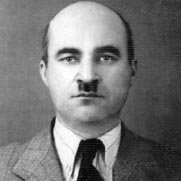Almas İldirim
Almas ildirim, one of the mighty figures of Azerbaijan emigration poetry, whose names and works are considered as a symbol of grief, longing and separation, is striking with its unique poetic personality, style. The story of this unusual talent, not only with his biographies but also by his biography, drove through Dagestan, Turkmenistan and Iran and lived there until the end of his life.
As it is known, the poetry of gothic poetry in Azerbaijan literature has been more than a thousand years old. In the works of dozens of artists who were forced to live far away from the homeland, Talysh's rule depicts strife, suffering, pain and grief of Homeland. But the fate of any of them is not like the lifestyle of Almas ildirim. In the works of none of them, foreigners do not become as hard as the poems of Almas ildirim. One reason for this is that the poet's fate is due to the intruders and complexity of the fate, and the other reason is the spirit of his creativity.

Almas ildirim was born in 1907 in Baku. She first studied at the "Ittihad" school in which the Iranian government opened, along with her mother tongue, she also learned Persian language perfectly. Later, the future poet, who is in line with the 12th Baku Gymnasium, has been trained here.
Almas ildirim started his creative career at the end of the twentieth century. The poems of Hussein Javid, Ahmed Javad, Mikayil Mushfiq, Seyid Hussein's literary environment created by him were published in "Education and Culture", "East Women", "Education Worker" and literary collections.
Almas ildirim's first book, "Yesterday-Today", written by Suleyman Rustam, coincides with 1926. (For certain reasons, Suleiman Rustam was forced to conceal this fact for a long time and did not mention the name of his book when talking about his biography).
Although Almas ildirim's first poems are met with sympathy by large audiences, it is disturbing in the upper circles. Of course, the reason for this concern was more than the content of the published poems, with its class affiliation, the association with the Musavatists, the relations with Turkey, the Turanism ideology. Almas ildirim's tragic days started as a workman from these years. He was admitted to the Oriental Faculty of the Baku State University, where he was admitted to the merchant family in 1927. The poet later wrote as a memoir and tried to reflect the difficulties he faced as an artist in his time in Azerbaijan as well as the ideological struggles against nationalistic literature in his essay "Baku memories" published by Gurtulus (Berlin).

Later she was expelled from the Proletarian Writers' Society and deported to Dagestan, where she was discharged from the Chief Political Officer (QPU). She is continuing her pedagogical activity here, learning the history of the struggles, life, traditions, especially the struggle for independence, and tries to reflect all these in her creative work. Some poems and articles published by the poet in the Daghestan Fugarasi (Makhachkala) newspaper in Dagestan show that. Almas ildirim also participated as an organizer in the formation of the Derbent hub of the Dagestan Proletarian Writers' Society.
In 1930, Almas ildirim's poem and poem in Baku published a book called "The Mountains Calling", and this book is packed and confiscated from shops as an illusion of anti-communist ideas.
Later, the exiled Turkmen poet is engaged in pedagogical activity in Ashgabat and teaches at the secondary school where pupils from Iran and Caucasus immigrate. She regularly collaborates with the press, produces radio programs, engages in artistic creativity. The poet, who published his poems and articles in Ashkhabad's Zahmat newspaper, quickly attracts the attention and interest of the literary community. But here he is not comfortable, watching his activities and writings, inspecting, persecuting and oppressing them.
She was arrested by border guards who went to Iran with her family to deal with the dangers awaiting them. She was subjected to severe torture for one month. After his release, he lived for a while in Mashhad, Tehran, and Tabriz, and continued his poetic creativity, despite the weight of his financial situation.

Almas ildirim, who settled in Turkey since 1934, has been forced to live abroad by the end of his life, and has become one of the most powerful representatives of Azerbaijan's emigration poetry. Turkey's emigration, which has passed seventeen years of its existence, is one of the most original pages in its creative world. He has been a teacher of education in Palu, Elazığ, Tunceli and Malatya regions, as a karaarguzar in the municipality municipality and has been engaged in artistic activity. The author's poems are basically "Çınar altı", "Gökbörü", "Bozkurt", "Orkun" "" Counteraction "," Committing to Communism "," Gurulusht "magazines of Azerbaijani emigration in Germany, in local newspapers in Van and Malatya.
Almas ildirim lived in Ashgabat during his family life. Generally, the poet's four children are born; his sons Aras Almas continued his father's path, engaged in poetry, and published several books.
Almas ildirim's first creative outline shows that he has an extraordinary talent as a poet. His poetic talent with his first poems ("East", "Tomorrow", "Indian Girl", "India", "West", etc.) has made it known to the literary community by creating literary works of art.
Later, the poet was followed by each other as "I", "He is from me", "Conflict with the Araz", "The Mountains of the Caucasus", "Combined Two Nakhir", "Do not Come", "O Oval", "A Mountains", " "," Elvida, Baku ". While most of these poems are dedicated to the beauty of the Motherland, in the spirit of the mysteries, the social troubles and sorrows have found a poetic expression of self. Some of the writings are accompanied by the social motives. Let us recall that some of the poet's poems were also available to the Turkish press, which led to his being monitored by political circles.
Almas ildirim's exile life had a serious impact on the content of his work, expanded the scope of his subject, and made significant changes in his public appearances. "Mine to the mountains", "Turkim", "Gurbatda", "Garib Push", "Hani", "Kopet Mountains", "My incision", "Wounded", "What happened?", "One voice income remotely "," Call to Amudarya "," I have hope in youth "and so on. their poems clearly show this. Unlike his first poems, poetical examples depicting the separation of the native land from the native land, reflected in the spirit of the poet.
Almas ildirim's "Meni", "Asir Azerbaycan", "I Do not Know", "Dormitory of Dormitory", "Wild West", "Songs to the Mountain", "I Can Be a Victim", "For Guzgun", "Bir Gün", "Neylayim "" A friend "," Getting in with a pigeon "," Dying, living "," Letters of Gratitude "," Cursed poetry "," Golden Slavery "," Sacred Love "," One Day Comes "," Black Saga " and other poems were emigrated. The author's works created abroad can be regarded as an artistic example of his creativity. Because, in these works, socio-political moments, which make him a poet-citizen, have found a high artistic expression. On the other hand, the poet's poems of poetry are strikingly striking, as the creativity coincides with the stage of perfection.
However, one must pay attention to the fact that Almas ildirim is invisible, spiritually-moral bond between the poems he wrote in his native land, exile and abroad. The key factor to this is that the poet is deprived of exile and emigration, as well as in his homeland.
Posted from my blog with SteemPress : https://yasasteemit.000webhostapp.com/2018/10/almas-ildirim
It was an honest mistake. Apologised for the inconvenient caused.
no
I'm so sorry!
No prob